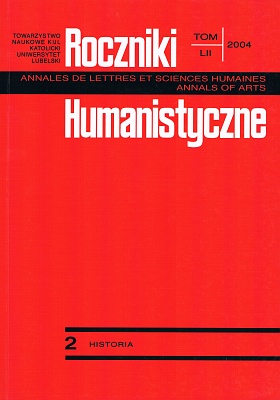The Rosary Brotherhood in Urzędów in the 18th Century
Abstract
Among the bigger and smaller social groups that have existed in the history, religious brotherhoods deserve a special attention. Their origin goes back to the Christian times. In the medieval Western Europe brotherhoods became a common phenomenon. In Poland, like in the whole Catholic Church, a specially dynamic development of brotherhoods took place only after the Trent Council. They became an important factor in the revival of the Church and they influenced the spiritual awareness of the society. They also played an important role in fighting Protestantism. Well-organized brotherhoods, often having their own altars, chapels and chaplains, realized their own public-religious aims contained in their statutes.
In the 17th-18th centuries Urzędów had four religious brotherhoods. Urzędów was a crown town, established by King Władysław Jagiełło in 1405. It was the seat of the deanery of the same name, which belonged in that time to the Zawichost arch-deanery and the Cracow diocese.
Three of the Urzędów brotherhoods were confraternities that were the best known and the most popular in Poland: The Literary Brotherhood, The St. Anna's Brotherhood, and The Rosary Brotherhood. Apart from them the unique St. Sebastian Brotherhood was active for a short time that did not exist anywhere else.
The oldest of them was the Literary Brotherhood of Our Lady, which was established in 1489; the youngest was the Jesus and the Immaculate Mary Rosary Brotherhood. It was established in 1721 and accepted in 1726. It was founded by noblemen, Krzysztof Węgliński and Benedykt Węgliński. The two men also had the right of patronage over the brotherhood. By virtue of the foundation and erection the brotherhood had its own benefice (rosary prebend), chapel with a fraternal altar in it, and its own prebendary. In his account of 1781 the inspector states that at the beginning the prebend had its own chapel adjacent to the parish church, but after the church had been burned down in 1755, and another one was built, the chapel was situated in one of the aisles.
The confraternity's main aim was to propagate the cult and glory of Our Lady as well as promoting and practicing the rosary services that were headed by an appointed priest who did the religious service in the brotherhood. The prebendaries were chosen and presented by the founders. The successive prebendaries in Urzędów were: Rev. Paweł Smoleński, Rev. Krakowiecki, Rev. Błażej Pezielski, Rev. Franciszek Szymański, Rev. Adrian Pawełecki. The last prebendary in the 18th century was Rev. Szymon (Mateusz) Tymiński. The successors of the confraternity founders had the right of presentation.
Brotherhoods, especially the bigger ones, had their own administrations. They were headed by the seniors who were obliged to see to the whole of their activities. Also the brotherhood scribe was an important person, as he entered the names of new members of the brotherhood in a special register; he also collected and noted down the membership fees. In the Urzędów Rosary Brotherhood most of the mentioned functions and tasks were performed by two trusted members, usually representatives of the municipal authorities, and, as a rule, wealthy people, called “provisories” or “seniors”.
The religious associations' activities were always based on bigger or smaller financial foundations. Of the Urzędów ones the Rosary Brotherhood had decidedly the most financial resources. Its wealth resulted from the benefice guaranteed by the founders and collators. Besides the property belonging to the brotherhood itself, their prebendary had his own, ample salary.
Both the prebendary and the brotherhood itself had estates, bequeathed sums of money on the estates belonging to the Urzędów townspeople, and revenues coming from collections, contributions and alms from the parishioners.
The fall of brotherhoods came in the period of a full bloom of the Enlightenment in Europe and the development of the so-called Catholic Enlightenment. In the period immediately preceding the final fall of Poland in 1795 all brotherhoods active there were doomed to wretched existence and slowly they ended their life in the initial phase of the occupation of the Polish lands by the three invaders. In 1801 only the Rosary Brotherhood still worked at the Urzędów church, while the remaining ones stopped their activities, and their benefices were given to the parish after the fire of the parish church in 1755. The other sources of income and charity bequests were assigned for building a new church. The Rosary Brotherhood continued its work after Poland lost sovereignty, through most of the 19th century. However, the political and social conditions in which it had to work was completely new; also the situation in which the Polish Church found itself was completely different from the previous one.
Copyright (c) 2004 Roczniki Humanistyczne

This work is licensed under a Creative Commons Attribution-NonCommercial-NoDerivatives 4.0 International License.





